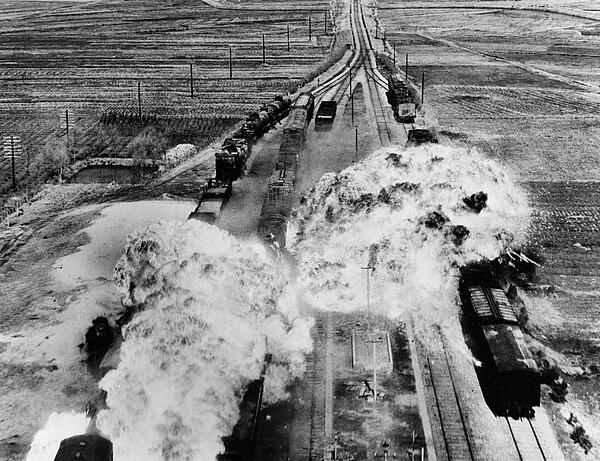The Korean War
The temperature of the Cold War increased sharply at the outbreak of the Korean War in 1950. America and Communist China and the USSR indirectly clashed during the conflict, which lasted three years.
By the end of WWII, the Korean peninsula was split into the Northern and Southern states. The North, which was communist and otherwise known as the People’s Democratic Republic of Korea, had the backing of the USSR, while the South, which was not communist and otherwise known as the Republic of Korea, was backed by the US. Korea had been ruled by Japan since 1910 but by 1945 it had been taken over by Communist forces from Russia, which split the country down the middle. As a result, the country was divided at the 38th parallel.
It was not a peaceful divide though, and the period after World War Two was a turbulent one, culminating in June 1950, when troops from North Koreans launched a sudden attack against the south. Within just three days of fighting the North had taken the Southern capital of Seoul.

In response to the incident, the UN tried to find a resolution; the United Nations Security Council (which the USSR was boycotting at the time) sent out a request UN states asking them to provide troops to join a united force that would march under the UN flag and bring peace between North and South Korea. In total, 15 nations sent troops, but the majority of these were American and the UN army was commended by renowned General Douglas MacArthur.
While the UN tried to assemble the troops the North continued to make swift progress through the south - come the end of August 1950, only Pusan in the south-east had not fallen to the North.
General Douglas MacArthur took a huge risk in September. He launched an amphibious landing at Inchon, which was around 200 miles behind enemy lines. This was successful, and MacArthur then started an advance from the Pusan Peninsula. North Korean forces were at risk of being split in half and so opted to retreat. On 25 September, Seoul was retaken by South Korean forces.
MacArthur, who was only meant to push the North Koreans back and reclaim Seoul, decided that he would ignore these orders and take things further. The General wanted to continue his advance north and believed that China would not take any action against this tactic. However, when MacArthur and his forces crossed the 38th parallel which splits North and South Korea, China issued a warning for them not to approach the Yalu River, where the Chinese-North Korean border lay.
Overcome by his desire to defeat the Communists, MacArthur disregarded this warning and advanced north towards the Chinese border at the Yalu River - the Chinese stayed true to their word and launched an attack of their own against the UN and South Korea forces. The Chinese had a 180,000-man army that was supported by a further 100,000 soldiers in reserve. The sheer size of the army left the UN troops with no choice but to retreat and by January 1951 Seoul had once again fallen into Communist hands.
Eventually the two sides reached a stalemate as for the first six months of 1951 the Chinese and UN troops stayed either side of the 38th parallel.
Soon after the two sides entered into peace talks, which took place at Panmunjom and lasted for two years. There were two main events in 1953 that finally helped to speed up the peace negotiations: in January, Truman was replaced by Dwight Eisenhower as US President, and in March, Josef Stalin died.
An armistice was signed on 27 July 1953.
Although there were many stages where no fighting took place, the Korean War was still a bloody conflict:
- The United States lost 36,574 men.
- South Korea lost around 137,899 men.
- North Korea lost between 215,000 to 350,000 men.
- China lost 152,000 men.
Between 3.5 and 4 million civilians were killed.
| Gains | Losses | |
|---|---|---|
| Korea | None | Casualties : dead and wounded : 1.3 million South Korean military; 520,000 North Korean military; Over 3 million civilian casualties. Much industry destroyed, agriculture ruined, millions of refugees. |
| UN | Gained respect by taking prompt and direct action. Used combined force to stop aggression. Achieved joint action by members. |
17,000 casualties; conduct of war almost entirely by USA and UN could have been seen as a USA puppet |
| USA | Saved South Korea from communism. Containment policy seen to work against Asian communism. |
142,000 casualties. Defence spending went up from 12 to 60 billion dollars and failed to liberate North Korea. |
| Russia | Achieved closer friendship with China. Conflict between China and USA was to Russia’s advantage. |
Forced into an expensive arms race with America. |
| China | Gained the respect of Asian communism. Saved North Korea from America. Kept a crucial buffer state on the eastern frontier. Achieved closer friendship with Russia |
900,000 casualties. Cost of the war was immense for a poor country. Failed to win South Korea for communism. Increased American protection for Taiwan (Formosa). Isolated by America in trade and politics. |
MLA Citation/Reference
"The Korean War". HistoryLearning.com. 2026. Web.
